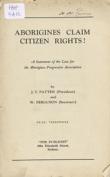AustLit
 3024384088075068808.jpg
3024384088075068808.jpg
This image has been sourced from online.
y
 Aborigines Claim Citizen Rights! : A Statement of the Case for the Aborigines Progressive Association
single work
Aborigines Claim Citizen Rights! : A Statement of the Case for the Aborigines Progressive Association
single work
 Aborigines Claim Citizen Rights! : A Statement of the Case for the Aborigines Progressive Association
single work
Aborigines Claim Citizen Rights! : A Statement of the Case for the Aborigines Progressive Association
single work
Issue Details:
First known date:
1938...
1938
Aborigines Claim Citizen Rights! : A Statement of the Case for the Aborigines Progressive Association
The material on this page is available to AustLit subscribers. If you are a subscriber or are from a subscribing organisation, please log in to gain full access. To explore options for subscribing to this unique teaching, research, and publishing resource for Australian culture and storytelling, please contact us or find out more.
Latest Issues
AbstractHistoryArchive Description
'Resolution to be moved at Australian Aborigines Conference, 1938, sesqui-centenary day of mourning & protest.' (Source: Back cover)
Notes
-
'Resolution to be moved at Australian Aborigines Conference, 1938, sesqui-centenary day of mourning & protest'. (Back cover of 1938 publication)
Publication Details of Only Known VersionEarliest 2 Known Versions of
Last amended 26 May 2015 12:33:40
Export this record


